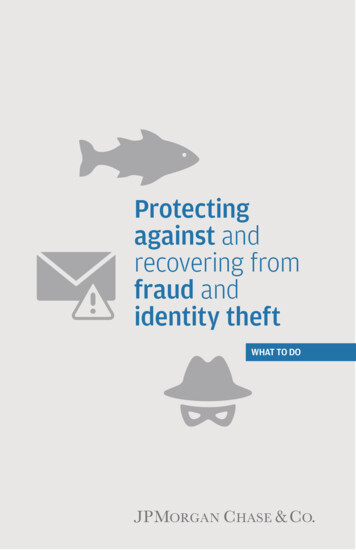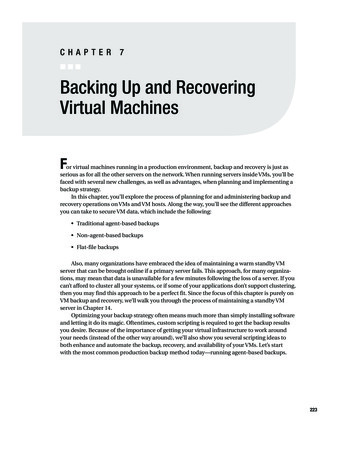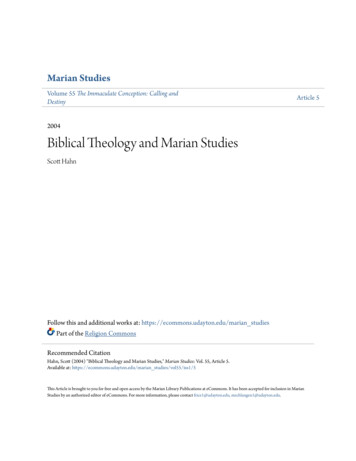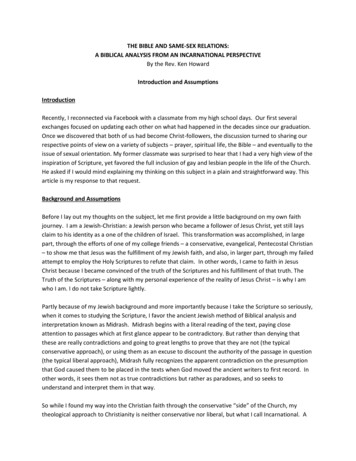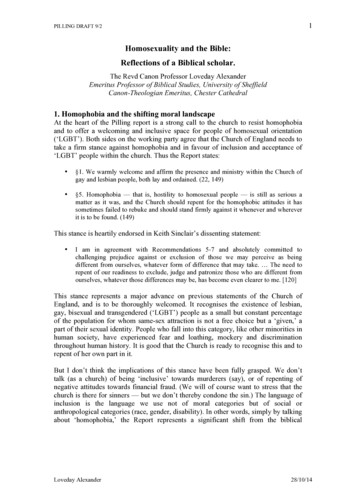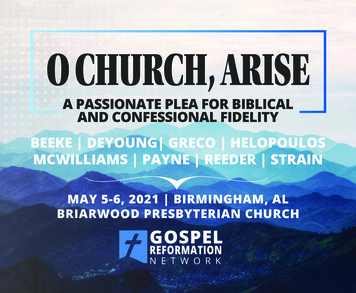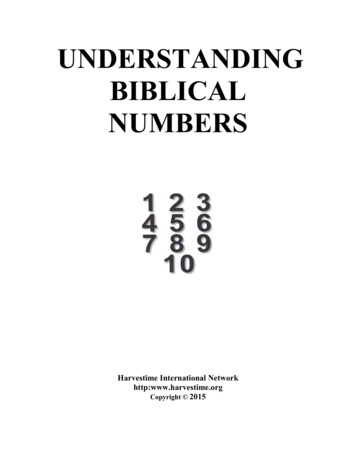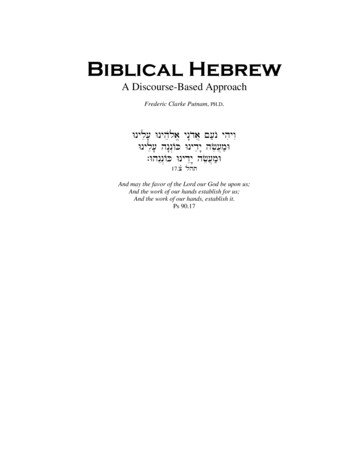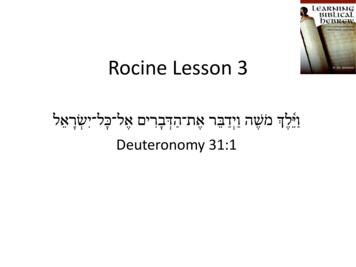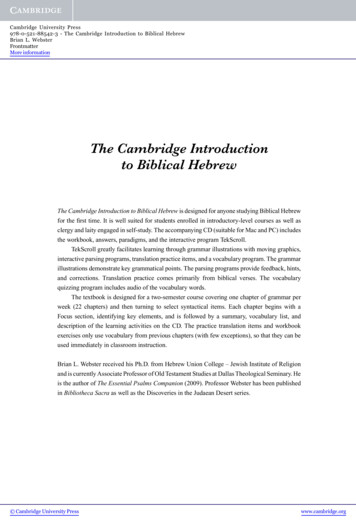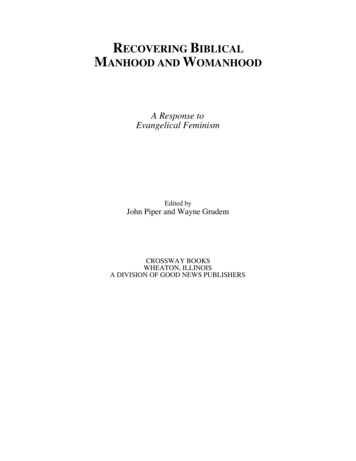
Transcription
RECOVERING BIBLICALMANHOOD AND WOMANHOODA Response toEvangelical FeminismEdited byJohn Piper and Wayne GrudemCROSSWAY BOOKSWHEATON, ILLINOISA DIVISION OF GOOD NEWS PUBLISHERS
Recovering Biblical Manhood and Womanhood.Copyright 1991 by the Council on Biblical Manhood and Womanhood.Published by Crossway Books, a division ofGood News Publishers, Wheaton, Illinois 60187.All rights reserved. No part of this publication may be reproduced, storedin a retrieval system or transmitted in any form by any means, electronic, mechanical,photocopy, recording or otherwise, without the prior permission of the publisher, exceptas provided by USA copyright law.First printing, 1991Printed in the United States of AmericaThis book is sponsored by the Council on Biblical Manhood and Womanhood, P.O. Box317, Wheaton, IL 60189.Readers may order booklets of chapters 1, 3, 4, 13, 22, and 23 by writing the Council onBiblical Manhood and Womanhood, P.O. Box 317, Wheaton, IL 60189. Other chaptersmay be available as booklets in the near future.Library of Congress Cataloging-in-Publication DataRecovering Biblical manhood and womanhood /John Piper andWayne Grudem, editors.p. cm.Includes bibliographical references and index.1. Sex role-Religious aspects-Christianity-Miscellanea.2. Sex role-Biblical teaching-Miscellanea. 3. Men (Christian theology)-Miscellanea. 4.Woman (Christian theology)-Miscellanea. 5. Men (Christian theology)-Biblicalteaching-Miscellanea. 6. Woman (Christian theology)-Biblical teaching-Miscellanea. I.Piper, John, 1946- .II. Grudem, Wayne, 1948BT708.R415 1991 261.8’343-dc2090-20258ISBN 0-89107-586-099 98 97 96 95 94 93 92 9115 14 13 12 11 10 9 8 7 6 5 4 3 2 12
To Noël and Margaret3
TABLE OFCONTENTSAbout the Authors 7PrefaceJohn Piper and Wayne Grudem 10ForewordFor Single Men and Women (and the Rest of Us)John Piper 13Section I: Vision and OverviewChapter 1: A Vision of Biblical Complementarity:Manhood and Womanhood Defined According to the BibleJohn Piper 25Chapter 2: An Overview of Central Concerns:Questions and AnswersJohn Piper and Wayne Grudem 56Section II: Exegetical and Theological StudiesChapter 3: Male-Female Equality and Male Headship:Genesis 1-3Raymond C. Ortlund, Jr. (Trinity Evangelical Divinity School) 86Chapter 4: Women in the Life and Teachings of JesusJames A. Borland (Liberty Baptist Theological Seminary) 105Chapter 5: Head Coverings, Prophecies and the Trinity:1 Corinthians 11:2-16Thomas R. Schreiner (Bethel Theological Seminary) 117Chapter 6: ÒSilent in the ChurchesÓ:On the Role of Women in 1 Corinthians 14:33b-36D. A. Carson (Trinity Evangelical Divinity School) 133Chapter 7: Role Distinctions in the Church:Galatians 3:28S. Lewis Johnson (Believers Chapel, Dallas) 148Chapter 8: Husbands and Wives as Analogues of Christ and the Church:Ephesians 5:21-33 and Colossians 3:18-19George W. Knight III (Knox Theological Seminary) 161Chapter 9: What Does It Mean Not to Teach or Have Authority Over Men?:1 Timothy 2:11-15Douglas Moo (Trinity Evangelical Divinity School) 1764
Chapter 10: Wives Like Sarah, and the Husbands Who Honor Them:1 Peter 3:1-7Wayne Grudem 193Chapter 11: The Valuable Ministries of Women in the Context of Male Leadership:A Survey of Old and New Testament Examples and TeachingThomas R. Schreiner (Bethel Theological Seminary) 211Chapter 12: Men and Women in the Image of GodJohn M. Frame (Westminster Theological Seminary) 228Chapter 13: The Church as Family: Why Male Leadershipin the Family Requires Male Leadership in the ChurchVern Sheridan Poythress (Westminster Theological Serminary) 237Chapter 14: The Meaning of Authority in the Local ChurchPaige Patterson (Criswell College) 251Section III: Studies from Related DisciplinesChapter 15: Church HistoryWomen in the History of the Church: Learned and Holy, But Not PastorsWilliam Weinrich (Concordia Theological Seminary, Ft. Wayne) 265Chapter 16: BiologyThe Biological Basis for Gender-Specific BehaviorGregg Johnson (Bethel College, St. Paul) 285Chapter 17: PsychologyPsychological Foundations for Rearing Masculine Boys and Feminine GirlsGeorge Alan Rekers (University of S. Carolina School of Medicine) 299Chapter 18: SociologyThe Inevitability of Failure:The Assumptions and Implementations of Modern FeminismDavid Ayers (The King’s College) 320Chapter 19: LawIs It Legal for Religious Organizations to Make Distinctionson the Basis of Sex?Donald A. Balasa (Attorney, Chicago, IL) 343Section IV: Applications and ImplicationsChapter 20: The Family and the Church:How Should Biblical Manhood and Womanhood Work Out in Practice?George W. Knight III (Knox Theological Seminary) 353Chapter 21: Principles to Use in Establishing Women in MinistryH. Wayne House (Western Baptist College) 3665
Chapter 22: The High Calling of Wife and Mother in Biblical PerspectiveDorothy Patterson (Criswell College) 371Chapter 23: WhereÕs Dad? A Call for Fathers with the Spirit of ElijahWeldon Hardenbrook (St. Peter and St. Paul Orthodox Church, Santa Cruz) 384Chapter 24: Women in Society:The Challenge and the CallDee Jepsen (Author, Washington, D.C.) 394Chapter 25: The Essence of Femininity: A Personal PerspectiveElisabeth Elliot (Author, Massachusetts) 400Section V: Conclusion and ProspectChapter 26: Charity, Clarity, and Hope:The Controversy and the Cause of Christ(including a response to the statement by Christians For Biblical Equality)John Piper and Wayne Grudem 405AppendicesAppendix 1: The Meaning of Kephaleø (ÒHeadÓ): A Response to Recent StudiesWayne Grudem 424Appendix 2: The Danvers StatementThe Council on Biblical Manhood and Womanhood 4776
ABOUT THE AUTHORSJohn Piper is Senior Pastor of Bethlehem Baptist Church in Minneapolis. He hasauthored a number of books, including Desiring God and The Supremacy of God inPreaching. He received his B.A. from Wheaton College, B.D. from Fuller TheologicalSeminary, and Dr. Theol. from the University of Munich.Wayne Grudem is Associate Professor of Biblical and Systematic Theology atTrinity Evangelical Divinity School. He received his B.A. from Harvard, M.Div. fromWestminster Theological Seminary, and Ph.D. in New Testament from the University ofCambridge, England. He has written three books, including The Gift of Prophecy in theNew Testament and Today and 1 Peter in the Tyndale New Testament Commentaryseries. He and his wife, Margaret, have three children.David J. Ayers is Assistant Professor of New Testament at Kings College. He is agraduate of Edinboro University, PA(B.A.), American University (M.A.), and is in theprocess of finishing his Ph.D. at New York University. He and his wife, Kathleen, havetwo daughters.Donald A. Balasa is Executive Director and Legal Counsel for the AmericanAssociation of Medical Assistants. He has a B.A. and J.D. from Northwestern Universityand an M.B.A. from University of Chicago. He and his wife, Kate, have one child.James A. Borland is Professor of New Testament and Theology at Liberty BaptistTheological Seminary. He is a graduate of L. A. Baptist College (B.A.), L. A. BaptistTheological Seminary (M.Div.), Talbot Theological Seminary (Th.M.), and GraceTheological Seminary (Th.D.). He has written Christ in the Old Testament, A GeneralIntroduction to the New Testament, Old Testament Life and Literature, and Lectures onBible Prophecy. He and his wife, Cheryl, have six children.D. A. Carson is Professor of New Testament at Trinity Evangelical Divinity School.He received his Ph.D. from Cambridge University. He and his wife, Joy, have twochildren.Elisabeth Elliot is a noted speaker and author whose books include Shadow of theAlmighty, Passion and Purity, and Let Me Be a Woman. She is the mother of one andgrandmother of seven.John M. Frame is Professor of Apologetics and Systematic Theology at WestminsterTheological Seminary and Associate Pastor of New Life Presbyterian Church (PCA). Heis a graduate of Princeton University (B.A.), Westminster Theological Seminary (B.D.),and Yale University (M.A. and M.Phil.). He has written Doctrine of the Knowledge ofGod, Medical Ethics, and Toward Reunion: A Critique of Denominationalism. He and hiswife, Mary Grace, have five children.Weldon Hardenbrook has been pastor of St. Peter/St. Paul Orthodox Church forseventeen years. He is the editor of Again magazine and is the author of Missing inAction. He is a former Campus Crusade for Christ staff member. He lives in BenLomond, California.H. Wayne House is Vice-President for Academic Affairs and Professor of Theologyat Western Baptist College. He has a B.A. from Hardin-Simmons University, an M.A.from Abilene Christian University, an M.Div. and Th. M. from Western BaptistSeminary, a Th.D. from Concordia Seminary, St. Louis, and a J.D. from O. W. CoburnSchool of Law. He is the author of The Role of Women in the Ministry Today,Civilization in Crisis, and Dominion Theology, Blessing or Curse? A Biblical Look atChristian Reconstructionism. He and his wife, Leta, have two children.7
Dee Jepsen is Chairman of the Board at Regent University (formerly CBNUniversity). She was formerly public liaison to President Reagan for women’sorganizations. She has authored three books, including Women Beyond Equal Rights.She is married to former Iowa senator Roger Jepsen. They have six children and eightgrandchildren.Gregg Johnson is Associate Professor of Biology at Bethel College, St. Paul. He hasa B.S. from Bethel College and a Ph.D. from the University of North Dakota. He is theauthor of Cyto-genetics. He and his wife, Lois, have four children.S. Lewis Johnson, Jr. is minister at Believers Chapel in Dallas, Texas. He is agraduate of the College of Charleston, SC (A.B.) and Dallas Theological Seminary(Th.M., Th.D.) and has done graduate study in Edinburgh, Scotland, University of Basil,Switzerland, and Southern Methodist Seminary in Dallas. He is the author of The OldTestament in the New.George W. Knight, III is Administrator, Dean and Professor of New Testament atKnox Theological Seminary. He has earned a B.A. from Davison College, NorthCarolina, a B.D. and Th.M. from Westminster Theological Seminary, and a Th.D. fromFree University in Amsterdam. He has written Faithful Sayings in the Pastoral Letters,Prophecy in the New Testament, and The Role Relationship of Men and Women. He andhis wife, Virginia, have five children and four grandchildren.Douglas Moo is Associate Professor of New Testament at Trinity EvangelicalDivinity School. He is a graduate of the University of DePauw (B.A.), TrinityEvangelical Divinity School (M.D.), and the University of St. Andrews (Ph.D.). He wroteThe Old Testament in the Gospel Passion Narratives and A Commentary on James. Heand his wife, Jenny, have five children.Raymond C. Ortlund, Jr. is Assistant Professor of Old Testament at TrinityEvangelical Divinity School. An ordained minister with the Presbyterian Church inAmerica, he is a graduate of Wheaton College (B.A.), Dallas Theological Seminary(Th.M.), the University of California at Berkeley (M.A.), and the University of Aberdeen,Scotland (Ph.D.). He and his wife, Jani, have four children.Dorothy Patterson is a homemaker and adjunct faculty member of the CriswellCollege. She has a B.A. from Hardin-Simmons University, a Th.M. from New OrleansBaptist Theological Seminary, and a D.Min. from Luther Rice Seminary. She is acontributor to the NIV Women’s Devotional Bible, contributor of notes on James in theNKJV Study Bible, and assistant editor of the Criswell Study Bible and its revision TheBeliever’s Study Bible. She and her husband, Paige (see below), have two children.L. Paige Patterson is President of The Criswell College and Associate Pastor of FirstBaptist Church of Dallas. He is a graduate of Hardin-Simmons University (B.A.) andNew Orleans Baptist Theological Seminary (Th.M. and Th.D.). He has writtencommentaries on Titus, 1 Corinthians, 1 Peter, and the Song of Solomon. He and hiswife, Dorothy (see above), have two children.Vern Sheridan Poythress is Professor of New Testament Interpretation atWestminster Theological Seminary. His degrees include a Ph.D. from Harvard Universityand a Th.D. from the University of Stellenbosch, South Africa. He is the author ofPhilosophy, Science and the Sovereignty of God, Understanding Dispensationalists, andScience and Hermeneutics. He and his wife, Diane, have two children.George A. Rekers is Professor of Neuropsychiatry and Behavioral Science at theUniversity of South Carolina School of Medicine. He also serves as an Adjunct Professorof Counseling at Tyndale Theological Seminary in The Netherlands. He has a B.A. fromWestmont College and an M.A., C.Phil., and Ph.D. from the University of California, LosAngeles. He is the author of over eighty academic journal articles and seven books,including Counseling Families. He and his wife, Sharon, have five children.8
Thomas R. Schreiner is Associate Professor of New Testament at BethelTheological Seminary. He is a graduate of Western Oregon College (B.A.), WesternConservative Baptist Seminary (M.Div.), and Fuller Theological Seminary (Ph.D.). Hehas written Interpreting the Pauline Epistles. He and his wife, Diane, have three children.William C. Weinrich is Professor of Early Church History and Patristic Studies atConcordia Theological Seminary, Fort Wayne, Indiana. He has a B.A. from OklahomaUniversity, an M.Div. from Concordia Seminary, St. Louis, and a D.Theol. from theUniversity of Basel. He authored Spirit and Martyrdom and edited The New TestamentAge: Essays in Honor of Bo Reicke. He and his wife, Barbara, have three children.9
PREFACEA controversy of major proportions has spread through the church.It began over 20 years ago in society at large. Since then an avalanche of feministliterature has argued that there need be no difference between men’s and women’s rolesindeed, that to support gender-based role differences is unjust discrimination. Withinevangelical Christianity, the counterpart to this movement has been the increasingtendency to oppose any unique leadership role for men in the family and in the church.“Manhood” and “womanhood” as such are now often seen as irrelevant factors indetermining fitness for leadership.Many evangelical Christians have defended this position in writing. They includeLetha Scanzoni and Nancy Hardesty (1974), Paul Jewett of Fuller Seminary (1975),Richard and Joyce Boldrey of North Park College (1976), Patricia Gundry (1977),Berkeley and Alvera Mickelsen of Bethel College and Seminary (1979), Catherine ClarkKroeger (1979), E. Margaret Howe of Western Kentucky University (1982), GilbertBilezikian of Wheaton College (1985), Aida Spencer of Gordon-Conwell Seminary(1985), Gretchen Gaebelein Hull (1987), and many others, in articles, lectures, andclassroom teaching. Although they have disagreed on details, their common theme hasbeen the rejection of a unique leadership role for men in marriage and in the church.Yet these authors differ from secular feminists because they do not reject the Bible’sauthority or truthfulness, but rather give new interpretations of the Bible to support theirclaims. We may call them “evangelical feminists” because by personal commitment toJesus Christ and by profession of belief in the total truthfulness of Scripture they stillidentify themselves very clearly with evangelicalism. Their arguments have beendetailed, earnest, and persuasive to many Christians.What has been the result? Great uncertainty among evangelicals. Men and womensimply are not sure what their roles should be. Traditional positions have not been totallysatisfactory, because they have not fully answered the recent evangelical feministarguments. Moreover, most Christians will admit that selfishness, irresponsibility,passivity, and abuse have often contaminated “traditional” patterns of how men andwomen relate to each other.But the vast majority of evangelicals have not endorsed the evangelical feministposition, sensing that it does not really reflect the pattern of Biblical truth. Within ourchurches, we have had long discussions and debates, and still the controversy showssigns of intensifying, not subsiding. Before the struggle ends, probably no Christianfamily and no evangelical church will remain untouched.We have edited this book in the hope that it might lead to a constructive solution tothis controversy. Our secondary purpose is to respond to evangelical feminist writingslike those mentioned above-hence the subtitle, A Response to Evangelical Feminism. Weconsider these authors to be brothers and sisters in Christ, and we have endeavored torespond to them in sincerity and love. Yet we also consider their essential position to bewrong in the light of Scripture, and ultimately harmful to the family and the church.Therefore we have tried to respond to them in detail and with clarity, and we have inmany cases attempted to show that their interpretations of Scripture are simply notpersuasive, and should not be accepted by Christians.But our primary purpose is broader than that: We want to help Christians recover anoble vision of manhood and womanhood as God created them to be -hence the maintitle, Recovering Biblical Manhood and Womanhood. Our vision is not entirely the sameas “a traditional view.” We affirm that the evangelical feminist movement has pointed outmany selfish and hurtful practices that have previously gone unquestioned. But we hope10
that this new vision-a vision of Biblical “complementarity”-will both correct the previousmistakes and avoid the opposite mistakes that come from the feminist blurring of Godgiven sexual distinctions.We hope that thousands of Christian women who read this book will come awayfeeling affirmed and encouraged to participate much more actively in many ministries,and to contribute their wisdom and insight to the family and the church. We hope theywill feel fully equal to men in status before God, and in importance to the family and thechurch. We pray that, at the same time, this vision of equality and complementarity willenable Christian women to give wholehearted affirmation to Biblically balanced maleleadership in the home and in the church.Similarly, we desire that every Christian man who reads this book will come awayfeeling in his heart that women are indeed fully equal to men in personhood, inimportance, and in status before God, and, moreover, that he can eagerly endorsecountless women’s ministries and can freely encourage the contribution of wisdom andinsight from women in the home and church, without feeling that this will jeopardize hisown unique leadership role as given by God.On an even deeper level, we hope that every woman reading this book will comeaway saying, “I understand much more fully what it means to be a woman, and I amthankful that God made me a woman, remarkably different from a man, yetimmeasurably valuable in God’s sight and in His plan for the world.” And we hope thatevery man reading this book will come away saying, “I understand much more fully whatit means to be a man, and I am thankful that God made me to be a man, remarkablydifferent from a woman, yet immeasurably valuable in God’s sight and in His plan for theworld.”If that happens, then perhaps the path will be opened for clearing away muchconfusion, for diffusing much frustration over male-female relationships, and for healingmany of the heartaches that smolder deep within millions of men and women who havebeen the victims of a society without direction on how to understand our wonderful giftof sexual complementarity.A brief note about terms: If one word must be used to describe our position, we preferthe term complementarian, since it suggests both equality and beneficial differencesbetween men and women. We are uncomfortable with the term “traditionalist” because itimplies an unwillingness to let Scripture challenge traditional patterns of behavior, andwe certainly reject the term “hierarchicalist” because it overemphasizes structuredauthority while giving no suggestion of equality or the beau
Baptist Theological Seminary, and a D.Min. from Luther Rice Seminary. She is a contributor to the NIV Women’s Devotional Bible, contributor of notes on James in the NKJV Study Bible, and assistant editor of the Criswell Study Bible and its revision The Believer’s Study Bible. S
